Honor Magic 4 Pro review: A fast-charging flagship phone, with top-notch cameras and performance
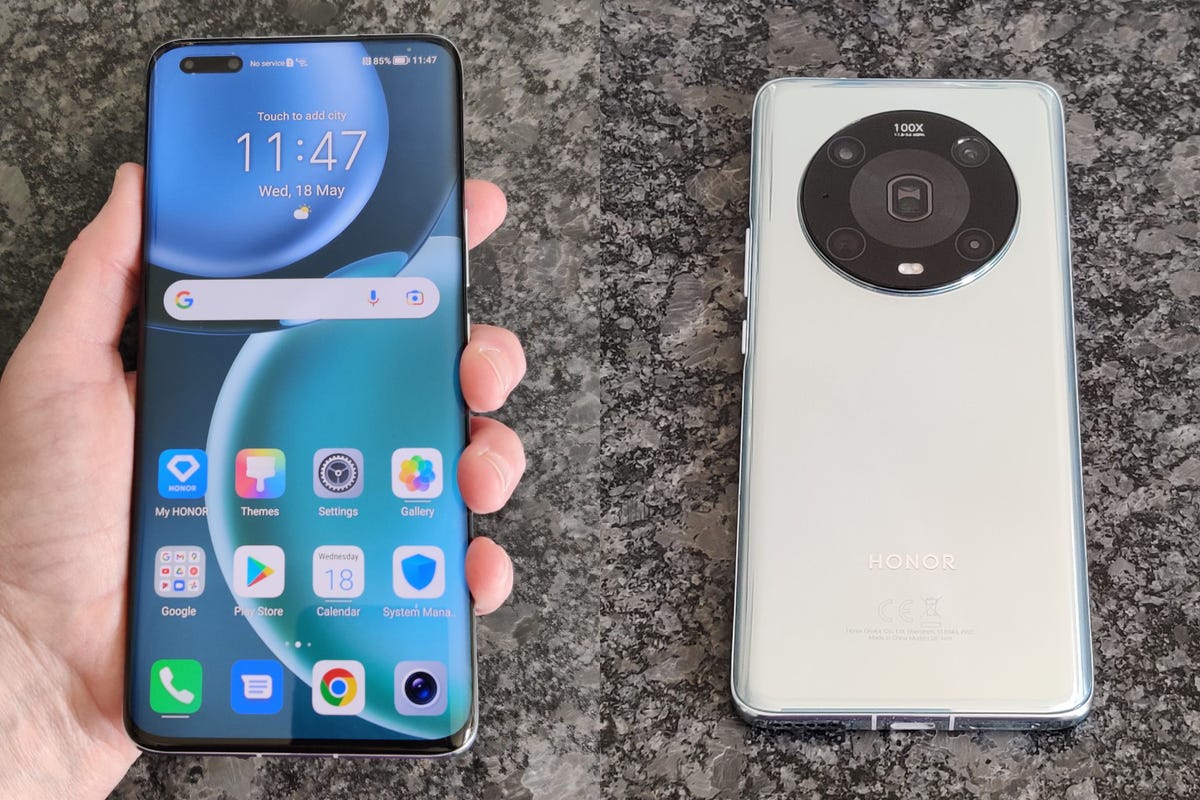
The 6.81-inch Honor Magic 4 Pro runs on Qualcomm’s Snapdragon 8 Gen 1 chipset with 8GB of RAM and 256GB of (non-expandable) storage. The 20:9 120Hz OLED screen has 1312 x 2848 (460ppi) resolution.
Images: Sandra Vogel / ZDNet

Since Honor became independent from Huawei and reclaimed access to the full suite of Google applications, the company has struggled to launch a true flagship handset under its own steam. The last Honor handset we reviewed was the Honor 50, running on the mid-range Snapdragon 778H 5G chipset. But now we have the Honor Magic 4 Pro, which is an altogether more premium handset.
The Magic 4 Pro isn’t quite the best Honor has to offer — there is a Magic 4 Ultimate with a huge 512GB of storage and a different camera setup, but we’re unlikely to see that in the UK. Still, the Magic 4 Pro comes in (just) under £1,000 at £949.99 (inc. VAT) and includes Qualcomm’s top-end Snapdragon 8 Gen 1 chipset, 8GB of RAM, 256GB of storage, a camera system including 3.5x digital and 100x optical zoom, and a 100W charger, with the option to buy a 100W wireless charger.
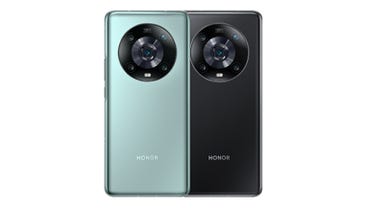
Like
- Superb 6.8-inch OLED screen
- Monochrome eBook mode
- IR blaster with remote control app
- Excellent cameras
- Very fast 100W charging
Don’t Like
- No MicroSD card slot
- Lots of bloatware
- Battery capacity could be higher
The Honor Magic 4 Pro has been designed to look distinctive. The backplate of my review unit was what Honor calls Cyan, although in fact its highly reflective glass back varies between pale lavender, pale blue and grey as it bounces light back at you. It’s a fingerprint magnet and also quite slippery, both of which I found irritating.
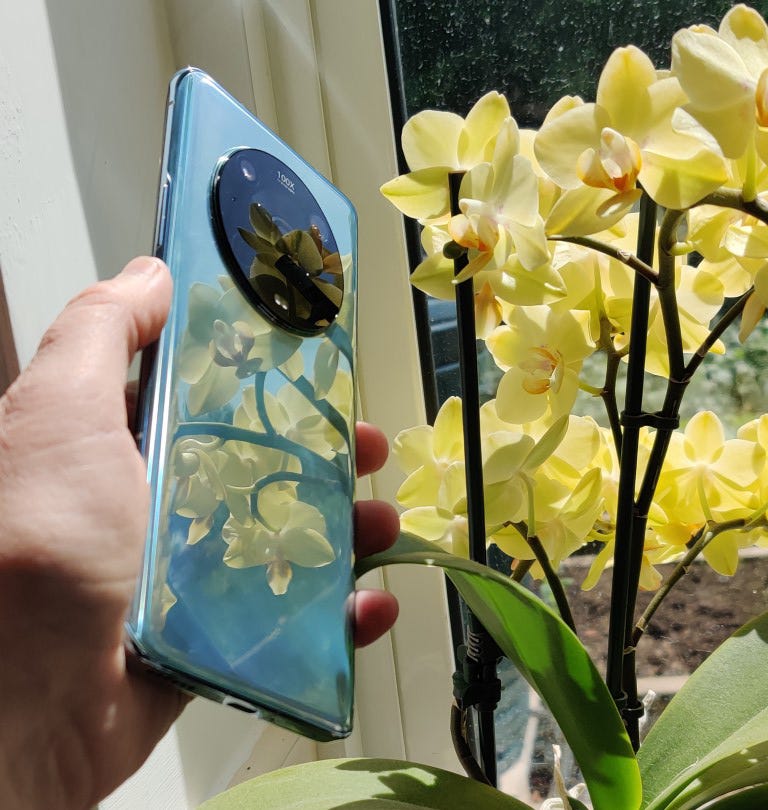
The Honor Magic 4 Pro’s backplate is both highly reflective and a fingerprint magnet.
Image: Sandra Vogel / ZDNet
There is a black version for those who don’t like the brighter option and if the backplate’s slipperiness annoys, then Honor’s provided clear bumper will deal with that. Without the bumper in place the huge, circular camera housing protrudes significantly from the backplate. Fortunately this is centrally located, so there is no rock-and-roll on a desk when the screen is prodded. The bumper actually protrudes slightly from the camera housing, providing a little lens protection.
Even without the bumper in place this is a big phone to handle. It is 9.15mm thick, 163.6mm tall and 74.7mm wide, and it weighs 215g. The front and back curve into the long edges, making for a comfortable hold, but, as with other big-screen flagships, you can expect to resort to two-handed use at times. If you’re concerned that the phone might slip out of your hands onto a hard floor or pavement, you’ll want the bumper for protection, and will also be pleased to see an IP68 rating for dust and water resistance and a pre-fitted screen protector.
The 6.81-inch OLED screen is superb. It has a 20:9 aspect ratio, curves into the long edges and has very small upper and lower bezels — Honor’s quoted screen-to-body ratio of 93.5% indicates just how much this handset is ‘all screen’. The display resolution of 1,312 by 2,848 (460ppi) with 10-bit colour, 100% DCI-P3 support and HDR10+ certification ensures a sharp image with vibrant colours. LTPO support allows the refresh rate to dynamically switch between 1Hz when nothing is happening up to 120Hz, conserving battery power without compromising usability. Honor also implements 1920Hz PWM (Pulse Width Modulation) dimming, a technique designed to reduce the flicker that some users can see and which can cause distraction or headaches.
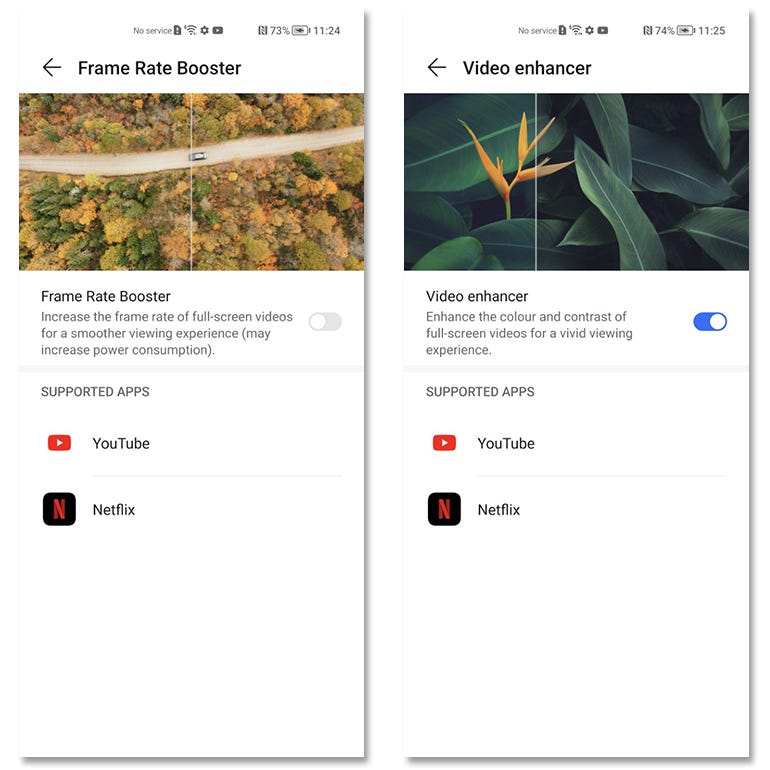
Screenshots: Sandra Vogel / ZDNet
Users have plenty of scope to tweak the display settings. For example, there is a frame rate booster that will uprate video for smoother viewing, and a video enhancer that will boost colour and contrast: both support YouTube and Netflix out of the box.
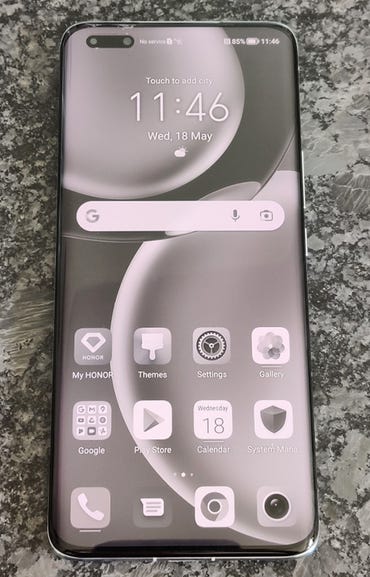
The Honor Magic 4 Pro’s monochrome eBook mode.
Image: Sandra Vogel / ZDNet
Eye Comfort mode can be set to come on to a timed schedule with user control available for filter level and colour temperature; there’s also an eBook mode, which sends the screen into monochrome, making it easier on the eye when reading text. OnePlus appears to have abandoned this feature following its business relationship with Oppo, while Honor has adopted it. Even better, eBook mode can be put onto the drop-down menu so it’s easy to access. The next step for Honor is to allow simply opening an app to invoke this mode.
SEE: The best Android phones: Better than the iPhone?
A pair of speakers output sound from the short edges. Audio quality could be better, with a lack of bass tones frustrating my enjoyment of some music genres, but I’ve heard worse, including much more degradation with rising volume.
The Magic 4 Pro runs on Qualcomm’s flagship Snapdragon 8 Gen 1 chipset, with 8GB of RAM in my review handset. This performed predictably well under the Geekbench 5 CPU benchmark, turning in average scores of 1139 (single core) and 3395 (multi core). This puts it on a par with premium handsets like the OnePlus 10 Pro (1007 and 3485) and Xiaomi 12 Pro (1226 and 3491).
The removable SIM caddy will accommodate two 5G Nano-SIMs. The fingerprint scanner is under the screen, and I found both this and face login to be fast and responsive.
There’s 256GB of internal storage, which can’t be augmented with a MicroSD card. Some might not see this as an issue, but if you still like to swap files manually, or have huge libraries of your own music or other files that you want to access via a memory card, it’s a dealbreaker. Out of the box, Honor uses 21GB, leaving 235GB free.
Android 12 is joined by Honor’s Magic UI 6, which provides the eBook reading mode and a lot of other settings tweaks. One such is Multi-Window, a little tool that you pull out of the right side of the screen with a sweep and hold. This contains shortcuts to apps you can open in miniature, resizable windows. If several mini-windows are activated, tiny movable icons sit anchored to one long edge and tapping these switches between the apps.
The screen is large enough to accommodate this in practical terms, but the process of sweep-and-hold to open an app and then tap to switch between open apps is a bit of a fiddle, and I couldn’t manage it one-handed.
Honor provides multiple apps over and above the Android standards. Its own app store and club app is joined by a Themes app, some duplicates for Android tools such as a Gallery, and lots of third-party applications from the usual suspects. More fun is Honor’s own Smart Remote app, which allows you to control a wide range of devices like TVs and projectors using the phone’s IR blaster — located on the top edge of the handset.

Zooming at 100x, with an on-screen framing window showing where you’re zooming into.
Screenshot: Sandra Vogel / ZDNet
There are three cameras in a huge circular housing at the back: 50MP f/1.8 wide angle; 50MP f/2.2 ultra-wide angle with 122° field of view; and 64MP f/3.5 periscope telephoto offering 3.5x optical zoom and 100x digital zoom. The periscope lens sits in the centre of the circle, making for a neat design feature. There’s also a sensor that’s designed to reduce flicker while shooting photos, and a TOF focus sensor to deliver faster focus and improved bokeh effects.
Point-and-shoot photography was great. Colours are vibrant, focusing is fast, and the camera software itself is easy to navigate. A side button in the framing window maxes the optical zoom to 3.5x, and another takes you to 10x. Thereafter zooming is achieved via screen-pinching, and a small framing window pops up on-screen to help you identify which part of the larger image you’re zooming into. It’s all very straightforward.
It’s no surprise that the closer you get to 100x zoom, the lower image quality becomes. And despite having OIS, zooming in to anything close to 100x is an activity only for the steady-handed or tripod owners. Still, the lower zoom levels are great for everyday shooting, and the rear camera system performs very well overall.
At the front there are two pinholes in the screen’s top left corner. One is the 12MP f/2.4 wide-angle (100°) selfie camera, and the other is a 3D depth camera designed for face login rather than photography. You can capture 4K video on both front and rear cameras.
The Honor Magic 4 Pro has a 4,500mAh battery, which is about 500mAh less than most flagship handsets currently offer. The phone lasted for 9 hours 21 minutes under the PCMark for Android Work 3.0 battery life test — a disappointing result considering that the expectation is over ten hours these days. However, when I set a fully charged Magic 4 Pro to play YouTube video non-stop for three hours it lost just 15% of its power, suggesting total battery life of 20 hours. Clearly it depends what you’re doing, but you should expect to get through a day without resorting to a recharge.
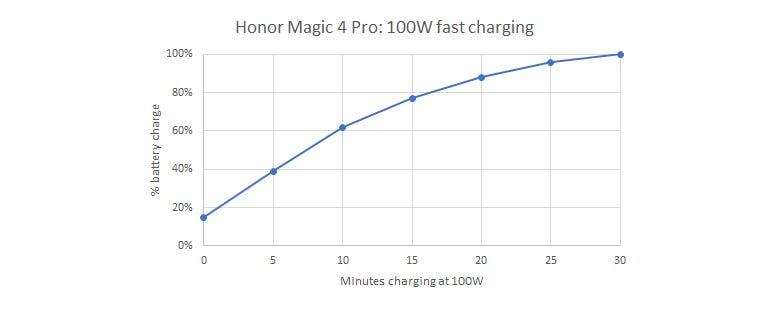
Chart: ZDNet
When you do need to recharge, a big plus point is the Magic 4 Pro’s 100W charger. This took the battery from 15% to 39% in five minutes, to 62% in 10 minutes, to 77% in 15 minutes, 88% in 20 minutes, 96% in 25 minutes and 100% in half an hour. Honor also has an optional 100W wireless charger stand that can get the battery to 50% in 15 minutes. Priced at £84.99, this was available as a bundled gift (along with an Honor Watch GS 3) at the time I reviewed the Honor Magic 4 Pro.
Conclusions
The Honor Magic 4 Pro has a great 120Hz OLED screen and an impressive camera system. Fast charging is hardly a novelty these days, but the fast wireless charging that’s also on offer here is rare.
Still, the battery capacity could be bigger and there is a lot of unnecessary software on-board, while the absence of a MicroSD card slot might disappoint some people. Even so, the Honor Magic 4 Pro is a very credible flagship smartphone.
Honor Magic 4 specifications
| Dimensions | 74.7mm x 163.6mm x 9.15mm |
| Weight | 215g |
| Display | 6.81 inches, 1Hz-120Hz (LTPO) OLED, 1312 x 2848 (20:9, 460ppi), 10-bit colour (1.07 billion colours), 100% DCI-P3, HDR10+ |
| Screen to body ratio | 93.50% |
| IP rating (dust & water resistance) | IP68 |
| Chipset | Qualcomm Snapdragon 8 Gen 1 |
| RAM | 8GB |
| Storage | 256GB |
| MicroSD card slot | no |
| OS | Android 12 + Magic UI 6.0 |
| Rear cameras | 50MP f/1.8 wide angle, 50MP f/2.2 ultra-wide angle (122˚), 64MP f/3.5 periscope telephoto (3.5x optical, 100x digital zoom, OIS) |
| Front cameras | 12MP f/2.4 wide angle (100˚), 3D depth |
| Battery | 4500mAh li-polymer |
| Charging | wired: Honor 100W SuperCharge • wireless: up to 100W SuperCharge (wireless charger is an optional extra) |
| Networks | 5G, 4G LTE, 3G, 2G GSM |
| SIM slots | 2x Nano SIM, eSIM |
| Wi-Fi | Wi-Fi 6 (802.11ax) |
| Bluetooth | 5.2 |
| NFC | yes |
| Infrared | yes |
| GPS | GPS / AGPS / GLONASS / BeiDou / Galileo |
| Sensors | gravity, compass, fingerprint, gyroscope, ambient light, proximity |
| Ports | USB-C (3.1, OTG) |
| Speakers | stereo |
| 3.5mm headphone jack | no |
| Price | £949.99 (~$1,180) |
Alternatives to consider
There’s an increasingly wide choice of flagship smartphones with high-end specifications, plus premium design and build quality. Here are three leading contenders.
RECENT AND RELATED CONTENT
Android 13: How to sign up and install Beta 1 on your Android phone — and why you should wait
OnePlus 10 Pro review: A superb screen heads up an excellent-value specification
Xiaomi 12 Pro review: Top-notch screen and chipset, but battery life disappoints
Poco F4 GT review: A fast-charging flagship-class gaming phone
The best Android phones: Better than the iPhone?
Read more reviews







